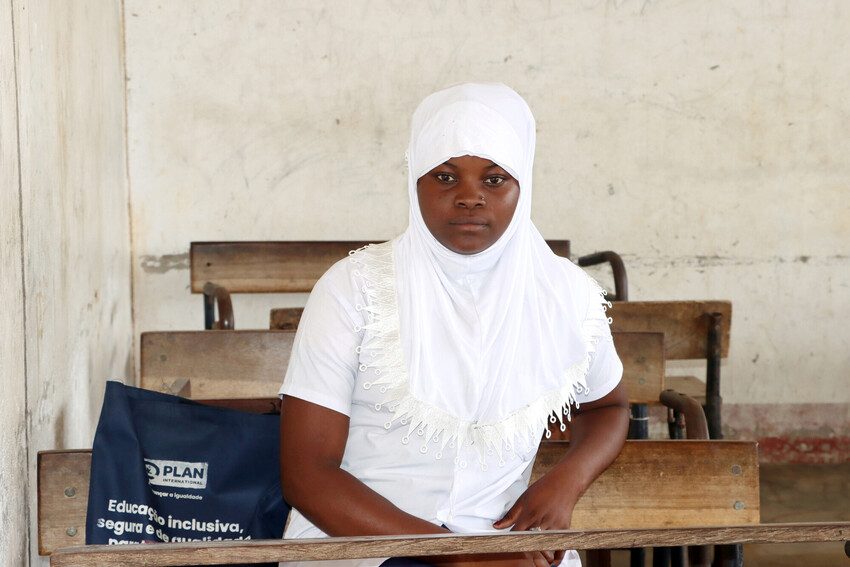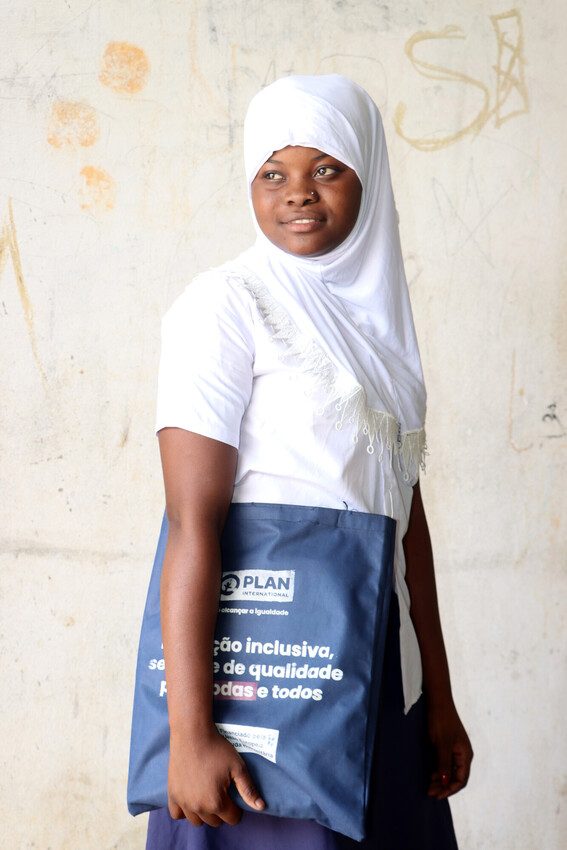Displaced by conflict, now back in school
After leaving her home and spending a year out of school due to conflict, Zaida has returned to education to follow her ambition of becoming a nurse.

Zaida, 16, in classroom refurbished by Plan International. © Plan International.
In 2021, Zaida and her family were forced to flee their home after heavy fighting broke out in Cabo Delgado in Mozambique. “Our escape began on foot, in desperation and without a clear route. We just wanted to get to a safe place. We had no food, so we ate tubers and wild fruit that we found in the forests along the way. As it was the rainy season, we drank stagnant water from puddles and kept walking.”
After 3 weeks of walking and a car journey they found shelter in an accommodation centre set up for people displaced by conflict in Mozambique’s northernmost province.
“When we arrived at the centre, life was difficult and the conflicted relationship with the host community made it difficult for us to adjust,” Zaida recalls. “They complained that we received food aid and they did not. In retaliation, they would not let us collect water or grow crops on their land. They even went as far as not letting their children play with us. It was a very difficult time.”
Life disrupted by conflict
Unable to attend school, Zaida was worried about her future. “As well as losing my studies, I lost my clothes, we lost our household goods and even the house itself. We left everything behind. Before we left, my father had a farm where he produced cassava, rice and maize, and at harvest time, with the sale of the crops, he was able to buy some things and build a beautiful house.”
“I have always liked studying so that I can learn to read and write and have a job in the future.”
Zaida
After more than a year in the accommodation centre, things became safer. Hearing that many of their neighbours were returning home, Zaida’s family decided to leave the centre at the end of 2022. “I missed my school and my village. I had not studied while we were in Montepuez and I was very anxious to go back to school,” says Zaida.
Finally, in 2023, the family arrived home. “When we went to our house, we were surprised to see that there was no major damage. Some doors had been torn off and windows broken, but the rest of the structure was fine,” says Zaida.
Back to school

The first thing Zaida wanted to do was visit her old school and re-enrol. “I have always liked studying so that I can learn to read and write and have a job in the future. My dream is to become a nurse because I like helping people, and this way I will be able to help people in the hospital, especially mothers and children.”
Zaida was surprised to find that not only was her school open and fully operational, but that construction was underway to improve and expand the facilities. “They were building more classrooms and renovating the toilets. I was able to go back to school and I received supplies such as notebooks, pencils, pens and even a folder.”
As the security situation stabilised, many families began to return to their homes and, as a result, many children returned to school. However, some returning children did not resume their studies because they were too traumatised by their experiences or their families did not have the means to pay for their education. Some girls did not return to school because of teenage pregnancy or early marriage.
“I know girls who don’t study and others who have dropped out,” says Zaida, now 16 and in fifth grade. “I try to encourage them to go back to school, but they ask me what they’re going to do at school. What will they study to earn money? They ask these questions, but I don’t give up trying to convince them to go back to school. I have a classmate who dropped out of school because she got pregnant and now has a baby. I don’t want to get married or have a baby, I’m still studying.”
Safe education for conflict-affected children
Plan International’s Emergency Education and Protection project, funded by the European Union, restores access to education in a safe and protective environment for children affected by conflict in Cabo Delgado, northern Mozambique.
The three-year project (2023-2025) operates in 4 districts and will benefit 65,000 children.
We are repairing schools damaged by violence, building temporary learning spaces, providing learning kits to help students return to the classroom, training teachers and constructing latrines and washing facilities. Mobile teams also identify out-of-school children and encourage their families to enrol them in school.
Through our partner HelpCode, we are also implementing protection initiatives to improve the well-being of children affected by the conflict. Through games, psychological support and educational initiatives, children in Cabo Delgado are regaining a sense of control over their lives.
Categories: Education, Emergencies


